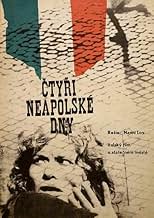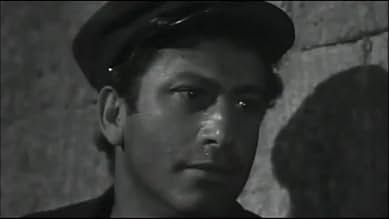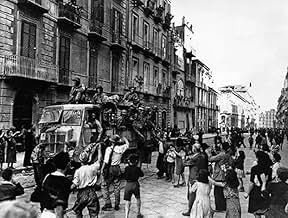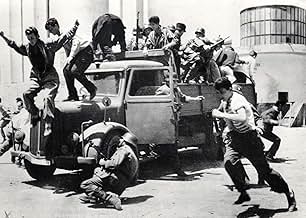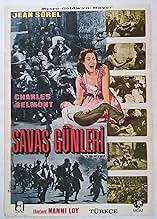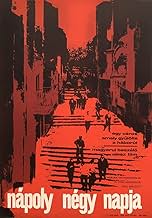Ajouter une intrigue dans votre langueThe film shows the history of the Neapolitan popular revolt against the invading Germans during World War II. During the four days in Naples, the revolt turns over in just a few hours. Neapo... Tout lireThe film shows the history of the Neapolitan popular revolt against the invading Germans during World War II. During the four days in Naples, the revolt turns over in just a few hours. Neapolitans slung on rifles and guns or armed themselves with stones, house-objects, gasoline-b... Tout lireThe film shows the history of the Neapolitan popular revolt against the invading Germans during World War II. During the four days in Naples, the revolt turns over in just a few hours. Neapolitans slung on rifles and guns or armed themselves with stones, house-objects, gasoline-bottles, anything and everything, anonymous and silent. Gennarino Capuozzo, a 10-year-old k... Tout lire
- Réalisation
- Scénario
- Casting principal
- Nommé pour 2 Oscars
- 9 victoires et 9 nominations au total
- Giovanni Ajello
- (non crédité)
- Sailor
- (non crédité)
- Concetta Capuozzo
- (non crédité)
- Immacolata
- (non crédité)
- Partigiano
- (non crédité)
- Cicillo
- (non crédité)
- Scared Woman
- (non crédité)
- Strongman
- (non crédité)
- Gennaro Capuozzo
- (non crédité)
- Pitrella
- (non crédité)
- Sakau
- (non crédité)
- Arturo's Mother
- (non crédité)
- Scared Woman
- (non crédité)
- Grieving Woman
- (non crédité)
- Maria
- (non crédité)
Avis à la une
I watched this film in basic training camp in 1963. I did not know at the time if I was being ordered to Southeast Asia to participate in the war there or not. I had had a vision on the firing range that an active combat role in Viet Nam would be more terrible than I could ultimately live with in later years. Fortunately, I was sent to the staging area on Okinawa, and not to Viet Nam. I saw the film again when I reached Okinawa, and became aware of the war a thousand miles away.
The film crystalized for me that mankind could choose not to fight wars to settle disputes between countries, and that passionate citizens could resist the most disciplined of armies. The Neopolitan people's example to me from twenty years before, as I stood at the brink of the Southeast Asian war, spoke deeply to me of what humanity must strive to achieve through the advancement of its behavior and character.
I long to see the film again, or to read the source book, as world events swirl around us, echoing themes in the Four Days of Naples.
For years I've tried to buy it, Le Quattro Giornate di Napoli, with no success. Then this year,TCM showed a very clean copy of it. But still I can't find a place to buy it. It is so worth having --
If anyone knows where I can buy it, I would be grateful.
Like many of you, I love movies. In every film that I've seen; sound and silent, short and feature length, narrative and documentary, a main character emerges. Sometimes, like in Fail-Safe and Dr. Strangelove, more than one emerges as part of a shifting focus, usually against the backdrop of a grand narrative. I've never seen a film, with the possible exception of very early cinema and raw news footage, where there is not even a pretense at a central character.
Instead, the city of Naples itself is the main character. With no disrespect meant to the men and women of Naples who faced the German Army, it's as though the city itself becomes a dog shaking off its deadly fleas.
Mall Megaplexes are jammed with the same few films, with different casts and titles perhaps, but stories told with a very limited scope. I encourage you to sample what great cinema looks like when told from a completely unique viewpoint.
The film is set in 1943. The Allies have invaded Sicily and are on the move northward. In nearby Naples, word arrives that the Italian army has surrendered--and the residents are thrilled as it looks like the war is over for them. However, the Germans go immediately from allies to enslavers and they begin committing atrocities on the Italians. Soon, the Neopolitans realize that unless they fight back, they will die--thus begins four days of bloody fighting between mostly civilians and the German army throughout the streets of the town.
Because this was a battle to save he city, it's made up of lots and lots of separate vignettes all strung together. Some are very compelling--such as the boys of the reform school leaving to join in the fight--even though many look to be only about 10 or even younger. Others are more bizarre as there are TONS of women running about screaming and getting in the way of the fighting. About the only thing that did not ring true in these stories was when they showed a couple people pulling the pins out of grenades with their teeth---something that only occurs in movies and never in real life (you'd lose your teeth doing this).
This film works very well. Of course, much of this is because it was well-directed, but I also loved the neo-realistic style (though most films in this style were made a decade or more earlier)--with non-actors playing the parts of the citizens. While the film could have been like an American epic (such as "The Longest Day")--star-studded throughout, instead the real folks made it all come alive--like we are really watching the battles unfold. Realism--realistic looking deaths, heroism, occasional cowardice--realism from start to finish.
By the way, although it's a very good film, I would really love to see it re-captioned. That's because like many films captioned many years ago, the people doing this didn't feel a need to caption everything the people said or caption it word for word. I dislike this intensely--as would most film purists. I've seen much worse captioning--but also much, much better.
By the way, you can't blame the film makers, but the tanks used in the film were modern tanks like American-built Walker Bulldogs--not vintage German tanks. There just aren't that many Panzer tanks left and they certainly weren't going to risk the few possibly still available making a film.
Le saviez-vous
- AnecdotesAll actors accepted to be uncredited in honor of the civilians who died during the uprising and remained without official recognition.
- GaffesAt the beginning of the scene in which Allejo and his gang of kids are having a shootout from the mountain train and Cazzillo gets shot, around 1h 31min, a piece of glass in front of him reflects the crew.
- Crédits fousWhen the MGM lion roars, no sound comes out of its mouth.
- ConnexionsEdited into Film socialisme (2010)
Meilleurs choix
- How long is The Four Days of Naples?Alimenté par Alexa
Détails
Box-office
- Budget
- 800 000 $US (estimé)
- Durée2 heures
- Couleur
- Mixage
- Rapport de forme
- 1.66 : 1
Contribuer à cette page


